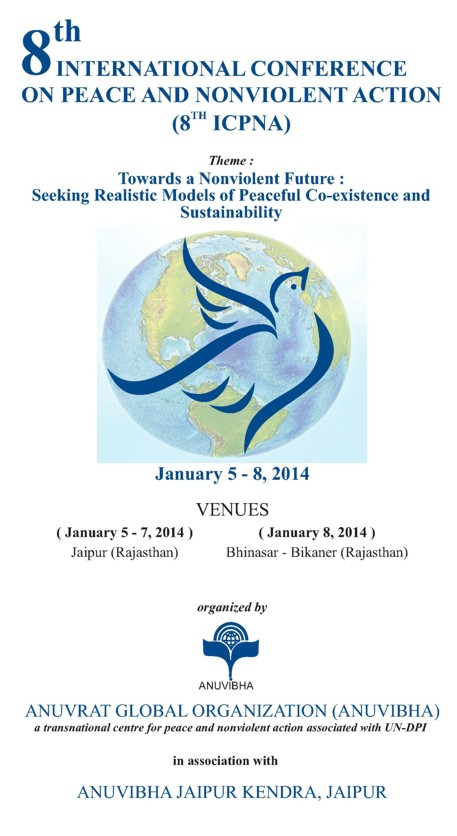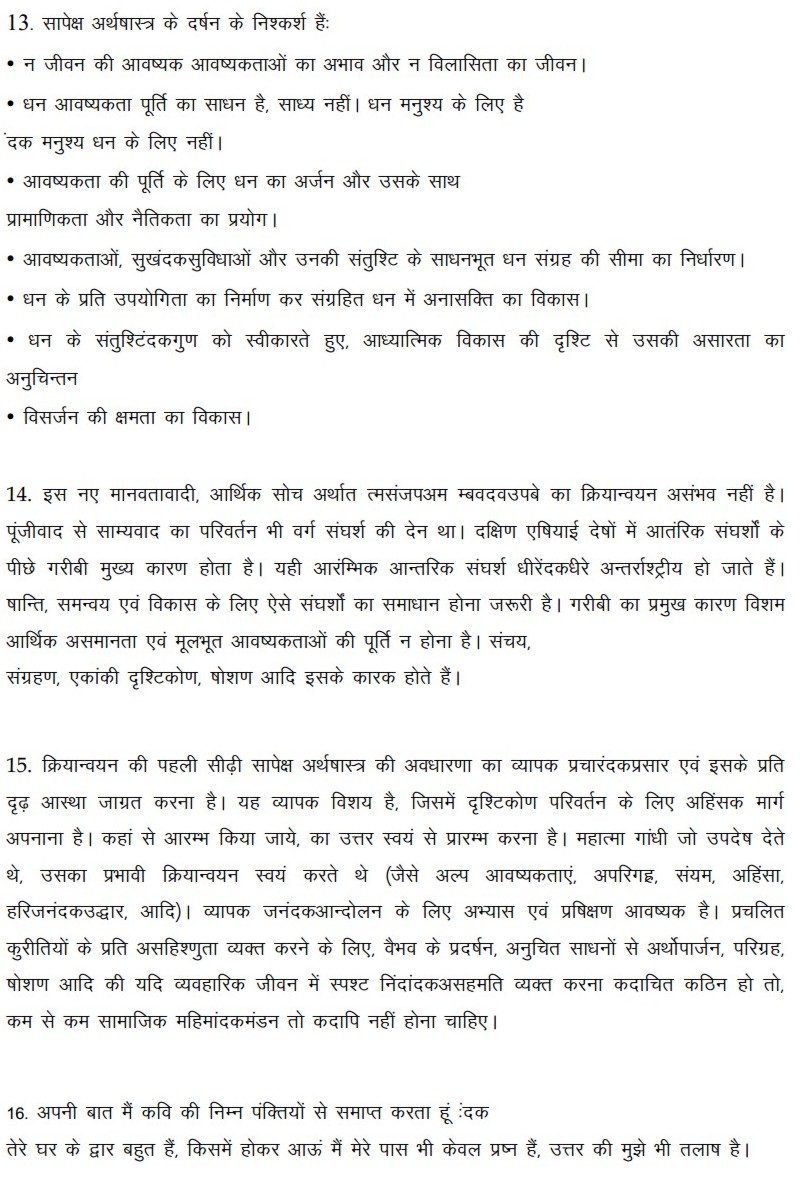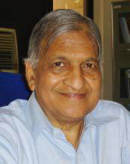 | 8th International Conference on Peace and Nonviolent Action |
1. The concept of Relative Economics was coined by Acharya Mahapragya during the first International Conference on “Economics of Non-violence and the Vision of a Sustainable World” in New Delhi on Dec. 5-7, 2005 and subsequently we have had the similar kind of International Conferences at Jaipur, Udaipur and Ladnun under the auspices of Late Acharya Mahapragya. A number of economists argued with Acharyashri why he has coined the term Relative Economics. This vision was born on the basis of his Ahimsa Yatra and in-depth readings and practice of Jainism. The world is passing through a great turbulence. Today what we see happening in different parts of the world is most unexpected. Man has lost its mental peace due to extreme consumerism. Economic development in different parts of the world is going very fast. Each nation is in competition with other nations, but we must know that the world has limited resources on which the economic development is based. The old definition of economics, i.e., wants are unlimited, resources are limited and they have multiple uses is being questioned. Acharya Mahapragya challenged this very definition of economics and he went to the root cause of the problem. It is rightly said that the war begins in the mind of man and past world wars have been result of this catastrophe of the mind. So it is the mind which needs to be addressed first, hence the philosophy of Anekantavada, non-possession of wealth and the concept of visarjan.
2. It has been accepted by most of the development - thinkers in the world that ‘Sustainable Development’ is a necessary condition for growth and development and this goal needs to be pursued vigorously by all the countries in future. Michael Spence’s Growth Report: Strategies for Sustained Growth and Inclusive Development, 2008, is a new addition to the literature on this growth subject. Dani Rodrik has critically examined the various issues related with economic growth in his famous book One Economics, Many Recipes: Globalization, Institution and Economic Growth, 2007. Inclusive growth reduces the development gaps between nations, regions, communities, individuals, economic sectors and technologies, but only sustained growth, which caters to the needs of the present as well as the future generations, can lead to durable and balanced growth for peace and prosperity of mankind.
3. The world has experienced with models of ‘Command Economies’, ‘Capitalist Economies’, ‘Mixed Economies’, ‘Neo-classical or liberal Economies’, but rather than solving the problems of different countries, they have created more problems for them. It is now felt that there is something radically wrong with these models of growth, because the discontents and conflicts are increasing in the whole world in modern times. Globalization of terrorism is increasing at a faster rate rather than the globalization of various economies of the world. Resources of the world in terms of land, water, minerals, forests, etc. are limited. Resources are getting depleted at a terrific rate. There is excessive use of global economic resources by countries like China, and some other developed countries of the world. Neo-classical model of development has helped countries like China and India to achieve high growth rates in recent years and in achieving some successes on the external front, such as accelerating export growth rates and accumulating large foreign exchange reserves, etc. But the problems of economic inequality and social tensions have increased under their liberalized regimes. Countries like India have to grapple with problems of poverty, unemployment, malnutrition, disease and backwardness in years to come. In fact, the problem of internal insecurity is to be tackled first, otherwise all efforts towards socio-economic transformation would come to naught in future.
4. Sustainable development model can provide a lasting solution to the problems of both the developing and the developed countries. It is not confined to the sphere of economic change alone, rather it includes under its ambit other spheres also; such as political, environmental, social, energy, technology, etc. A new term ‘Triple Bottom Line (TBL) or ‘People, Planet, Profit’ has been coined for it, which, in essence, means social development (for the term people - in terms of population stabilization and improvement in quality of life for all), environmental development (for planet - in terms of reducing the remissions of Green House Gases (GHGs) and combating climate change) and economic development (for profit - in terms of improving efficiency and equity in the economy). Thus, sustainable development ensures integrated development, because it is based on three Es, i.e. Efficiency, Equity and Environment. But with the passage of time, to promote and strengthen sustainability, many more, E’s, could be added to it, such as Entrepreneurship, Employment, Entertainment, Empowerment of dis-advantaged groups in society and Enforcement of the laws and rules of the state. Each country should prepare its own roadmap of development, based on its culture, its stage of economic development, fiscal resources, political strength and aspirations of the people. It is pretty easier to ignite growth, but difficult to sustain it. Two-pronged effort is needed for growth: A short-run-strategy aimed at stimulating growth, and a medium-to-long run strategy aimed at sustaining growth (Dani Rodrik).
5. As indicated earlier, sustainable development requires a holistic or systemic approach to growth. Reductionist approach of modern social scientists like economists, sociologists, historians, political scientists, etc. won’t be helpful in this regard, because they mostly do not talk to each other and do not feel the need to talk to each other. Most of them work on simplified assumptions which are often far removed from the realities of life.
In fact, now, the time has come to consider the importance of some ‘soft factors or elements’, like honesty, discipline, hard work, sacrifice, humility, cooperation and compassion, etc. to solve multifarious human problems. They should not be ignored, simply because they are immeasurable, and, in some situations, clearly unidentifiable.
6. Now the question arises as to whether the existing developmental models can lead us to the goal of sustainable growth in future, or some inputs of ethics, religion and spirituality can be supportive in this pursuit. Here, it has been felt by some leading thinkers that Jain philosophy and thinking can show us the right path towards sustainability and lead us towards a durable and peaceful social order. It affects consumption, production, and distribution patterns so that the emerging economic order guarantees the fulfillment of the basic needs of mankind, but does not give scope for satisfying the greed of the people. It is based on the noble teachings of Lord Mahavir, who emphasized the role of three values for peaceful co-existence of mankind, viz; freedom, equality and ethical behavior. Jain philosophy emphasizes ‘Anekant’ (considering the views of others, and giving due respect to the view points of others) and Anu-vratas’, i.e. observing certain rules of good conduct, such as not harming others in any form, to resort to limitation of desires and accumulations, etc. It lays emphasis on equanimity of mind and temper, which is essential for peace in society. Secondly, it emphasizes a labor-absorbing and capital-saving decentralized development model in which people work largely in small units, free from problems of concentrated production in big units and free from exploitation of all types. There is little scope for environmental degradation and there is harmony between man and nature. There is compatibility between honesty and other aspects of human behavior such as economic, political, administrative and cultural. In recent times, unfortunately, honesty has been put on the back-burner and it is considered incompatible with growth and development in society.
7. “Modern economic development has opened opportunities of rapid growth for human beings in the universe. But it appears that it has given rise to complex problems of unbridled and uncontrolled exploitation of nature and mankind, with the result that we find extreme inequality, poverty, hunger and destruction around us. Time has come to give a u-turn to the prevalent economic thinking so that mankind may find lasting peace, solace, safety and security’. The idea of Relative Economics was born.
8. Relative Economics - The above observation by Mahapragya ji is the seed for the Relative Economics. Relative Economics should control “unbridled and uncontrolled exploitation of nature and mankind” and rid of “extreme inequality, poverty, hunger and destruction around us”. To put it in other words, Relative Economics stands for Sustainable Development and Inclusive Growth. In the light of ‘The Limits of Growth’, a report of the Club of Rome, published in 1972 stating that the world will run out of the nonrenewable resources on which the industrial base depends by 2100, sustainable development attains paramount importance. Many economists however, do not agree with the report’s conclusion. But sadly, an unrelated study ‘For the Common Good’ (1989), in which Daly and Cobb develop an information theory to replace or supplement the incomplete data function of what is known as the Gross National Product, by processing U.S. statistical data on some twelve so-called welfare indicators, drew the conclusion that for the last twenty years the link between production growth and the creation of welfare has become progressively weaker; prior to that date, production growth had achieved exactly what Adam Smith foresaw in 1752: the addition of value so as to indeed create the “Wealth of Nations.” In the 1970s this link began to be lost however, and this process is proceeding at such an accelerating pace that we are now confronted with the curious phenomenon of production growth leading to a decline in welfare; stated differently, the limits to growth have been reached without us even noticing it, because we have been interpreting the figures wrongly.’ It is essential, appropriate and timely to search for an alternative to the present economic system and prevent it from collapse as envisaged in The Limits to Growth. Relative Economics is going to play a major role in the world’s economy.
9. Late Acharya Mahapragya, a leading Jain saint, a spiritual visionary and an exponent of Jain philosophy, has emphasized the following pre-conditions for attaining the goal of a sustainable society:
(i) To turn towards vegetarianism from non-vegetarianism as far as possible, this will free a lot of land for agricultural production, particularly that of food grains for the teeming millions in a country.
(ii) To shun the use of liquor, drugs, narcotics, various animal products from wild life and harmful luxurious products. One can start with more and more moderation in their use in the process of this change over to a better individual consumption pattern with due restraints.
(iii) To resort to sharing and caring for others, rather than always accumulating more and more for oneself (Aparigraha), there must be a limitation on possessiveness and accumulation of wealth, because that will reduce tensions and conflicts in society, and create enough space for building an equitable world social order.
(iv) To prefer ‘Anekant’ (respect for the views of others), American
President Barak Obama, in his famous historic speech, has expressed sentiments in support of ‘Anekant’, when he says “I shall discuss with you (American people), when we disagree”. This is a very pious promise.
(v) To support the standard of life concept (simple living and high thinking) in preference to the standard of living concept (high living and no consideration at all for the level of thinking).
10. In the Ahimsa-tours of Acharya Mahapragya, and under his Ahima Training-Programs, people have gradually moved towards better life, from violence to non-violence, from vices to virtues, from inactivity to activity, from non-vegetarianism to vegetarianism, from untruth to truth and above all, from corruption to non-corruption. This is a great achievement in the present context of human affairs.
11. Science alone cannot provide us a prosperous and sustainable world to live. Thought it provides many comforts, it is finally the values of human beings that matter. A young and pure mind is the right place to show the seeds of values. A person thus trained in ‘aparigrah’ truthfullness and honesty will provide a basis for sustainable human society.
12. Since economics is not concerned with ethics, it aims at fulfillment of desire but does not care for the innate moral instinct of man. What is desirable is striking a balance between the two which means acquiring wealth without being dishonest and cruel. The richer the citizens, the stronger the nation. We do not realize that just as there is demand of the body and the mind there is demand of the conscience also. If the body requires material objects and mind fulfillment of desire, the conscience demands truthfulness, simplicity, honesty and transparency. This applies not only to individuals but to nations also. It is not only the problem of the individual but the problem of society also. Hence ethics-based development will be a real sustainable development, and lead us to a safer and more secure world. The time to make a final choice is here and now, otherwise never or nowhere.

References:
- Dani Rodrik, One Economics, Many Recipes: Globalisation, Institution and Economic Growth, 2007
- Drucker, Peter (1981), “What is Business Ethics?” The Public Interest, April. Hoffman, W. M. and J.M. Moore (1982) What is Business Ethics? A Reply to Peter Drucker,
- Jeffrey D. Sachs, Common Wealth: Economics For a Crowded Planet, 2008
- The Growth Report: Strategies for Sustained Growth and Inclusive Development, 2008, (Chairman: Michael Spence)
- Kaler, John, Reasons To Be Ethical: Self-Interest and Ethical Business, (September 2000)
- Klein S., “Drucker as Business Moralist”, 2000 - Volume 28, Number 2, November, 121-128(8).
- Lynn, Jacqueline, A Matter of Principle, (August 1995)
- Michael Spence, Strategies for Sustained Growth and Inclusive Development, 2008
- Obama’s $1 - Trillion Toxic Asset Purchase Plan”, views of Martin Feldstein, Stephen Roach, Paul Krugman and Joseph Stiglitz, The Economic Times, April 1, 2009, p. 13.
- Peter P. Rogers, Kazi F. Jalal and John A. Boyd, An Introduction to Sustainable Development, 2008
- Scott, Mary, Bottom-Line Blues: Is Ethical Business Only a Dream?, (January-February 1997)
- Solomon, Robert C., A Better Way to Think About Business: How Personal Integrity Leads to Corporate Success, 1999
- Sims, Ronald R, Ethics and corporate social responsibility: Why giants fall, 2003
- Gurucharan Das, India Unbound, 2002
- Alan Greenspan, The Age of Turbulence: Adventures in a New World, 2007
- Amartya Sen, The Argumentative Indian: Writings on Indian Culture, History and Identity, 2005
- Boroughs, Don L, The Bottom Line on Ethics. U.S. News and World Report, (March 20, 1995).
- Cohen, Ben, and Jerry Greenfield, Ben and Jerry’s Double Dip: Lead With Your Values and Make Money, Too, 1997
- Dalla Costa, John, The Ethical Imperative: Why Moral Leadership is Good Business, 1999
- Acharya Mahaprgaya, “Economics of Mahavira”, 2000
- Acharya Mahapragya and A.P.J. Abdul Kalam, “The Family and the Nation”, 2008
- Taking nature into account: A Report to the Club of Rome, Wouter Van Dieren, Editor; Springer-Verlag, 1995; ISBN 0-387-94533-4; Phone: 1-800-SPRINGER. Assessed on internet on January 16, 2010.

 Dr. Ashok Bapna
Dr. Ashok Bapna